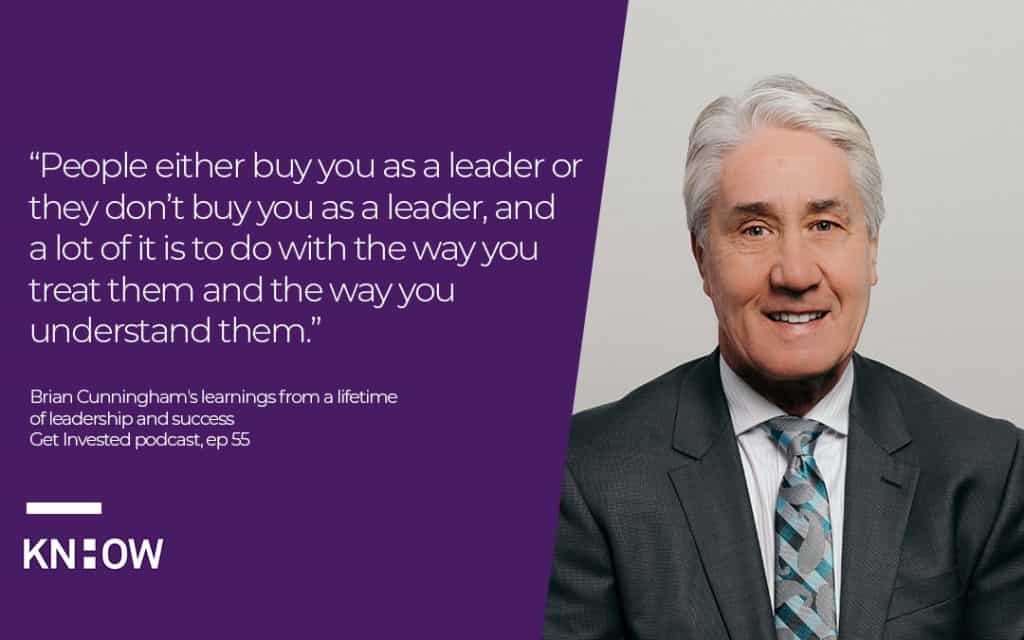Brian Cunningham was a local footy star and a school teacher with a comfortable career path, but even he couldn’t have predicted his meteoric leadership rise.
He played for Port Adelaide in the SANFL through the 1970s and into the early eighties, playing 256 games and winning multiple premierships. But there was no leadership plan or strategy when the club captaincy fell into his lap, so Brian leaned on his teaching skills to engage his team mates.
“Because I was university trained, I think through education, one of the things that I always say is that my teaching career taught me enormous amounts around people and how you deal with people and particularly how you communicate with people,” Brian told Bushy Martin on the Get Invested podcast.
“The more you tell them how good they are the better they get. And this whole focus on strength building, (Port Adelaide coach) John Cahill wasn’t someone who focused necessarily on weaknesses. He focused on the people’s strengths, and that, for me, has always been a big learning and I’ve carried it right through to today, that this whole strength building space is messy.”
Brian counted South Australia’s most highly respected and imposing sporting leaders, Port Adelaide legends John Cahill and Fos Williams, as his mentors, but learned just as much from every day people.
“You come across people in all walks of life in all ways, everyone has a story to tell and there’s always something about people that, because I’m a bit of a people watcher, that you go, ‘I reckon there’s something I can learn about that person’, how they did that, and what can you take out of that.
“People are motivated by different things. Is it achievement or is it working with people? Is it power or is it those sorts of things? Yep, or a bit of each of those, but understanding when you deal with people what their prime source of motivation is or how they are best motivated is a really interesting thing.
“I do a lot of coaching nowadays. You understand people, understand them well, know what makes them tick. The more you understand someone the better you can work with them to make them better.”
After transitioning out of teaching Brian’s next big jump was taking on the role of CEO of his beloved club, the Port Magpies, and leading the transition from the local SANFL competition to the national AFL.
Not only did Brian and his team win the AFL licence, the club’s net assets rose from $200,000 in 1992 to around $6 million just five years later.
“I go back to the work thing, hard work,” Brian said.
“We didn’t get it by just sitting back and expecting it to happen. We worked really hard. That (AFL licence) tender was a 600-page tender which the Board and I wrote, and it was a really compelling piece of work that said this is what we think we can do in terms of crowds, these are the sorts of profits we think we’ll have. This is what we’ll add to the national competition. This is how we’ll support the local competition with the dividends back, all of that stuff.
“So all of that was really well worked through and as it turned out, when we really sat back and we had a look at the business plan for the first three years of that entry to the AFL competition, we by far and away exceeded what we won the tender with. We were the most profitable club in the AFL in our first three years of entry. We had an average profit of just over a million dollars.”
Not content with his achievements at Port Adelaide, Brian entered the public sector to oversee $500 million South Australian government departments.
“It was a hard challenge to try and go from a high performance organisation like a football club with a lot of success and people who had specific roles and they were great at what they were doing and the success was measurable every week and every year, to government where things weren’t as measurable,” Brian said.
“Still some really good people in there, and you know governments can achieve a lot. Unfortunately, the politics probably gets in the way of the business.”
Now focused on business consulting and leadership coaching, Brian said his ultimate learning is that it isn’t just about him.
“It’s the whole thing about getting people to go with you and the way you go about it, and the whole team thing,” he said.
“I’ve had really good people supporting me, around me and mentoring me and I’m probably sensible enough to understand I’m not good at many things, but I’m good at certain things. If you get good people around you it makes a swag of difference.”
Listen to the full interview here.
Want to Know How you can build wealth with the help of leading, qualified experts? Talk to the team at KnowHow, now.




